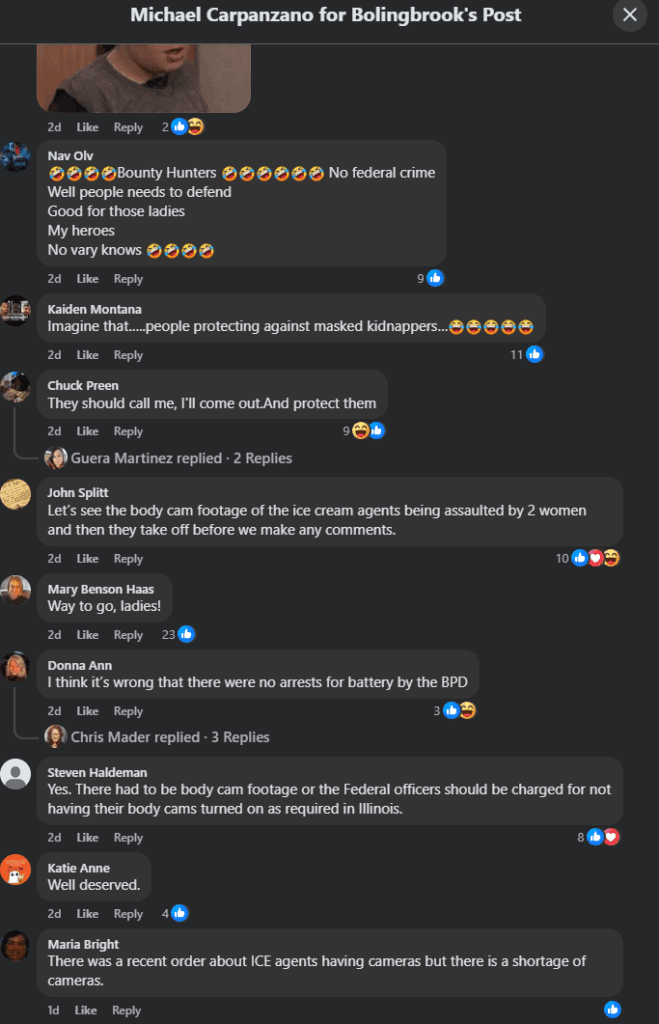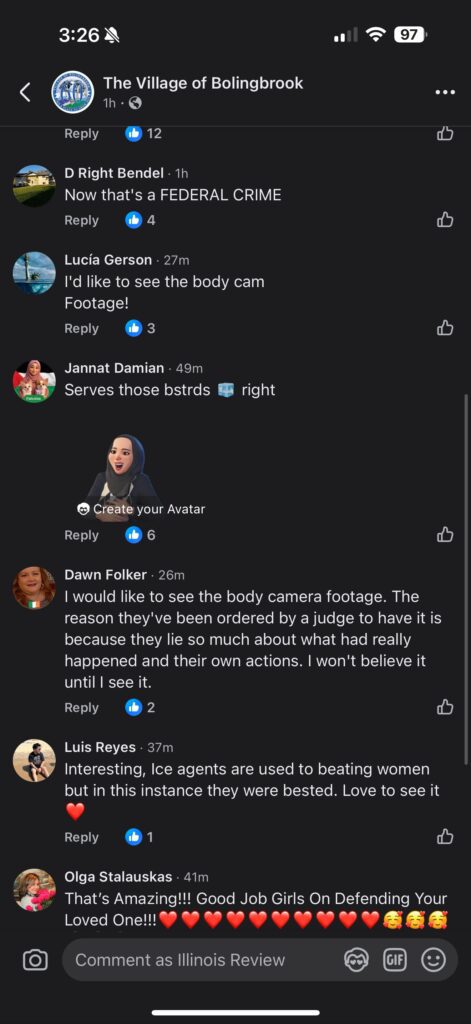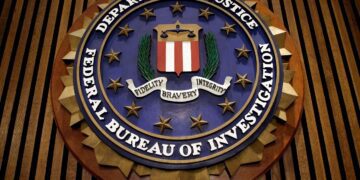By Illinois Review
Newly released 911 recordings obtained by Illinois Review confirm that two federal ICE agents were violently assaulted while performing a lawful arrest in Bolingbrook — and that the local police department refused to act, despite knowing a federal felony had occurred.
The new FOIA documents and audio files, paired with earlier evidence and official police reports, paint a disturbing picture of local inaction, political interference, and tolerance of open threats against law enforcement on official Village social media pages.
The incident, which took place on October 19, 2025, near Williamsburg Lane and the Beaconridge apartments, began when ICE agents attempted to take a 46-year-old male fugitive into custody. According to the 911 call placed by an ICE Supervisor, the agents were attacked by two younger Hispanic females who intervened to help the suspect escape.
“My officers got assaulted by two females that helped them escape,” LeTheis told the Bolingbrook dispatcher. “We can point out the apartment. They went inside. It just happened within five minutes.”
The suspects, both dressed in black, fled into a nearby apartment with the male fugitive. The ICE supervisor made clear that no weapons were used by the attackers, only fists and feet, and that his agents had defended themselves lawfully against the assault.
Under federal statute 18 U.S.C. §111, attacking an officer of the United States while performing official duties is a felony. Yet the 911 tapes and dispatch records reveal that Bolingbrook Police, fully aware that ICE officers were the victims of a federal felony, made no arrests and issued no detainment orders.
The radio traffic captures one officer confirming the report: “An ICE agent was attacked while trying to pull over a subject,” and then, seconds later, another responding unit is told, “You can disregard.”
That single phrase downgraded the response from a felony in progress to a routine service call. The case would later be logged as an “Aggravated Battery – Informational,” and closed with no arrests made.
Federal authorities have since confirmed that ICE is pursuing its own charges at the federal level. As reported previously by Illinois Review, this decision came only after Bolingbrook officials declined to prosecute or detain any of the suspects involved. You can read the original investigative reports here.
What makes this situation worse is what followed. Within hours of the assault, dozens of comments flooded the official Village of Bolingbrook Facebook page — posts celebrating the attack on the federal agents, mocking ICE, and in some cases threatening future violence.
Screenshots of those comments, now archived by Illinois Review show disturbing language such as “Serves them right,” “No sympathy for ICE,” and even calls to “defend our people next time too.” These were not random online trolls — many of these posts came from Bolingbrook residents using their real names, reacting directly to the Village’s official announcement of the incident. Not one of these comments was removed or condemned by Village administrators.


Instead, Trustee Michael Carpanzano, who manages several official Bolingbrook community pages, responded to only one individual after being confronted publicly, while ignoring hundreds of other comments that endorsed or incited violence against law enforcement.
For a Village that regularly moderates and deletes routine criticism of its leadership, the decision to leave violent threats untouched sends a chilling message about its priorities. When it comes to free speech, Bolingbrook’s government appears willing to tolerate threats against federal officers — but not dissent from its own residents.
Meanwhile, the newly released 911 audio makes clear that the ICE agents were the victims, not the aggressors. Supervisor LeTheis confirmed that his agents “physically restrained” the attackers only to stop the assault, and that no firearms were drawn. The ICE officers then immediately requested local assistance, as required by law, to identify and detain the suspects.
Bolingbrook Police did neither. Officers arrived, took basic information, approached the apartment where the suspects were hiding, received no response at the door, and left.
FOIA CALLS TO POLICE DEPARTMENT
That sequence of events constitutes a clear failure of duty. Under federal and state law, local police have an obligation to protect federal personnel engaged in lawful operations. The fact that dispatchers and officers explicitly acknowledged the victims were ICE agents, yet did not make a single arrest, raises serious legal and ethical questions.
Federal investigators are now examining whether a “stand-down” order was issued from within the department or at the Village level — a directive that would explain why responding officers were told to disengage almost immediately after confirming the details of the assault.
FOIA POLICE DISPATCH
Legal experts point to several federal statutes that could apply. Under 18 U.S.C. §4 (Misprision of a Felony), it is a crime for any public official to know of a federal offense and fail to report it. Under 18 U.S.C. §1519 (Obstruction of Justice), any destruction or alteration of records related to a federal investigation — including social media moderation or the deletion of public threats — can carry prison time.
If Bolingbrook officials suppressed evidence, ignored valid threats, or attempted to sanitize the record, they could face both federal and state-level consequences.
The Village’s public statement on the incident, released the same day, was equally telling. It described the event as a “battery” but made no mention of federal officers, the suspects’ flight into an apartment, or the legal seriousness of the attack. The Village offered no condemnation of the violence. Instead, they closed with a bland acknowledgment that “no arrests were made and medical attention was declined.” That brief and carefully worded release stands in stark contrast to the raw urgency heard in the 911 recordings.
Federal agents, meanwhile, did everything right. They pursued a lawful arrest, were assaulted, responded proportionately, and then called for local assistance. The refusal of that assistance — combined with public threats left unchecked on official Village channels — now casts Bolingbrook’s leadership in a bad light. It appears politics, not policing, dictated the department’s response.
This case is no longer just about one violent encounter. It is about a growing crisis of accountability in local government — a willingness to ignore the law when enforcing it might offend the wrong people. Bolingbrook’s handling of this assault shows how far local leadership is willing to go to appease anti-law enforcement activists, even at the expense of federal cooperation and officer safety. The ICE agents did their duty. The Bolingbrook Police did not.
As this investigation unfolds, it should serve as a wake-up call for every municipality in Illinois. When local politics override the rule of law, when elected officials tolerate open threats against those who protect and serve, and when federal crimes are brushed aside for convenience, the public loses faith — and justice disappears.
Bolingbrook’s silence speaks volumes, but the recordings now speak louder. The truth is on tape, and it tells a story of law enforcement betrayed by those sworn to uphold it.









